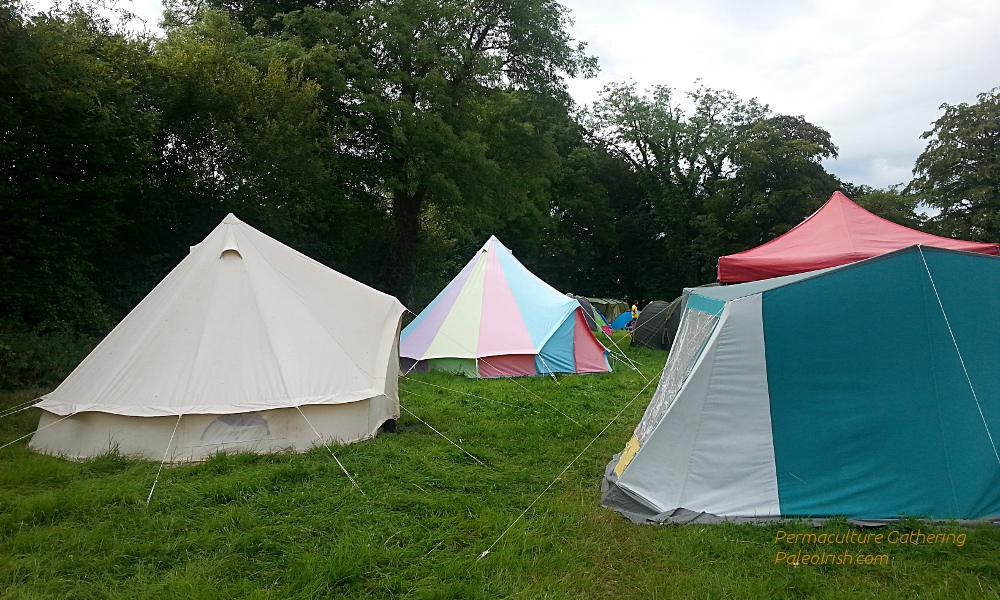[Note: Sorry this post is so late in coming! I've had a busy couple of weeks. I really wanted to get this out in the weekend of Sukkot, but, you know what they say about, "the best-laid plans of mice and men"....Anyhow, I hope you enjoy the post!]
Following along in our "
Fall Holiday" series, we have our last holiday post for the year; Sukkot, also called the Feast of Tabernacles. Sukkot is the last Israelite holiday on the calendar--(some of us celebrate Hanukkah, but it's not a mandatory holiday like those of Leviticus 23)--and, speaking honestly, Sukkot's the most fun. Sukkot has the least restrictions and most pro-party rules of any Israelite holiday.
 |
| Bigger Sukkot gatherings may look something like this (Link) |
Let's take a look at what the Bible has to say (Lev 23:33-44, removing a few for brevity and clarity, marked with "..."):
"And the Lord spake unto Moses, saying, Speak unto the children of Israel, saying, The fifteenth day of this seventh month shall be the feast of tabernacles for seven days unto the Lord. On the first day shall be an holy convocation: ye shall do no servile work therein....on the eighth day shall be an holy convocation unto you...it is a solemn assembly; and ye shall do no servile work therein....Beside the sabbaths of the Lord, and beside your gifts, and beside all your vows, and beside all your freewill offerings, which ye give unto the Lord.Also in the fifteenth day of the seventh month, when ye have gathered in the fruit of the land, ye shall keep a feast unto the Lord seven days: on the first day shall be a sabbath, and on the eighth day shall be a sabbath. And ye shall take you on the first day the boughs of goodly trees, branches of palm trees, and the boughs of thick trees, and willows of the brook; and ye shall rejoice before the Lord your God seven days. And ye shall keep it a feast unto the Lord seven days in the year. It shall be a statute for ever in your generations: ye shall celebrate it in the seventh month.Ye shall dwell in booths seven days; all that are Israelites born shall dwell in booths: That your generations may know that I made the children of Israel to dwell in booths, when I brought them out of the land of Egypt: I am the Lord your God. And Moses declared unto the children of Israel the feasts of the Lord."
To summarize, from day 15 of the seventh month for seven days, the Feast of Tabernacles is to be celebrated. Starting on the 15th, we must "dwell" in "booths" for seven days. The 8th day is an extra Sabbath, and so is the first day. We are supposed to feast, and use branches to "rejoice before the Lord". It's a happy holiday. It's a harvest holiday.
The booths rule comes to commemorate the 40 years the Israelites spent wandering in the desert after they were freed from Egypt. In that way, it's both happy and solemn. After all, the Israelites were only in the desert thanks to their cowardice and fecklessness (see Numbers 32 for the whole story). However, the remembrance is also happy; after all, God still protected the Israelites and took care of them during this time, and they were headed to the Promised Land (albeit for the second time...).
We celebrate Sukkot by doing exactly what is outlined above. I took off of work for the first and eighth days (being Wednesday, 10/8 and Wednesday, 10/15, respectively). Sven and I set up our tent in our backyard and slept there every night. We feasted and celebrated during the days (waving branches, dancing, singing, etc etc.). In addition, we got to have a little extra fun. My sister, who attends the University of Kansas, came out to stay with us from Friday to Monday. For us, this meant extra fun; for her, it meant fulfillment of the "feasting" part as well as the "convocation" part (college students poorness and, surprisingly enough, it's hard to find other Israelites where she is).
 |
| Pictured: Feasting, Family, and general Festivity |
There were good bits and bad bits of this holiday, as there typically are in any 7-day span of time. One of the worst things was the weather. Where we live, it tends to be very, very, very dry. Drought dry. Since it's so dry and flat, it also tends to be warm. We (foolishly) counted on this when making our initial Sukkot plans. Our yard it flat, and there's a nice secluded corner of the backyard where the ground is shielded on two sides by the house. This is where we first set up our tent. It was shielded from the wind and (rather annoying) streetlights, as well as from any prying eyes there might be. This worked out well. The first night. It was balmy; the full moon lit up the yard with its gentle glow. There was a slight breeze. We packed our tent with a sleeping bag and two quilts, and we were as toasty as bugs in rugs. The second night, the storms hit. Unfortunately for us, the spot we'd picked for our tent also happens to be the only spot in our yard that floods when it rains. That first rainy night, we spent about an hour debating; should we move the tent? Was it raining hard enough? Could we somehow divert the water? What would we do if the tent flooded? And, gosh darn, wasn't it hard to talk over all this thunder? (We were in the tent at the time) When the storm finally broke (for about an hour, around midnight) we moved our bedding into the back of our (covered) truck, and pulled the truck into the driveway. We slept in the truck that night and moved the tent the next day. Lesson learned; plan for all weather, not just the weather you typically have.
 |
| Like this. But at night. And windy. Very windy. (link) |
After that, the weather continued to be terrible. Windy, rainy, and dropping into the (windy and rainy) forties at night. My sister, who did not have a tent, slept in the truck while she was here, but we were in the tent. The wind and water pelting against a rain fly can be surprisingly loud. Needless to say, I showed up to my job a little sleepy and frazzled more than once during the week. Thankfully, we did not have another flooding problem, though we were worried about the wind carrying the tent away on the last night, so we set it up in our basement and slept down there. This is my fourth Sukkot, and, I have to say, the weather has been the worst. My first Sukkot, the temperatures were freezing, and Sven and I were sleeping in my truck (read: "metal tin can that acts as a refrigerator in cold temps), but we wore (
really) warm clothes, swaddled ourselves in (
really) tick and it was okay. Last year was simply gorgeous; we went out-of-state to visit some Israelite friends/relatives, and it was maybe 60 degrees each night. This time was just bad. However, the good bits were more than good enough to outweigh the bad.
 |
| Pictured: A bad place to set up a tent. |
For one, though I don't like to brag (cough cough), Sven and I are really good cooks. For this week, we have an obligation to pull out all the stops and cook delicious, filling, several course meals every night (that's what we take it to mean, anyway. Let's put the "feast" into "Feastday" and all that....)
 |
| Tasty and special Sukkot Salmon |
All-in-all, it was a great time. People sometimes ask, "Don't you miss Christmas/Easter/Halloween?", and the answer is no. For starters, my family was never huge on Easter/Halloween, and my dad very often pointed out the pagan nature of Christmas. The holidays I celebrate now have more meaning, are actually a part of my religion, and they're just
better. I'd trade one day of presents for a week of camping, feasting, and hanging out with family any day. In addition to all this, they're fun in a new way because they're something I've done most with myself or with Sven from the very beginning. We get to celebrate
our way. We don't have someone else telling us how to do or what to do. We look at the Bible, make sure we do what it says, and we can add our own bits on the way. For example, Sukkot is a time for board/card/etc games for us. I'm not exactly sure why. We don't love board games. We don't really play them normally, but when we get to be with family, it just seems fitting. So, when my sister was here, we played several nights' worth of paper telephone and the forehead-guess-who-I-am game. Another thing we decided was certain dishes to be cooked by our family every Sukkot in the future. One of which being 호떡 ("Hottoek", a type of Korean snack I'm sure I filled you in on in my
Korean food post). We
finally found a recipe online, and we were able to make them. The hot, gooey, sweet treats seem like a perfect fit for a fall holiday. So, we decided from hereafter, we shall always make 호떡 on the first day of Sukkot.
 |
| Pictured: Pure Happiness |
To finish off this post; what should you take away? 1) When camping in the fall, always keep tabs on the weather forecast and plan accordingly. 2) Don't let small troubles get in the way of doing the right thing/having fun. 3) If you believe in it, read your Bible. Read it closely. There's more there than what meets the eye, and it can open up a whole new world for you. Happy fall!








